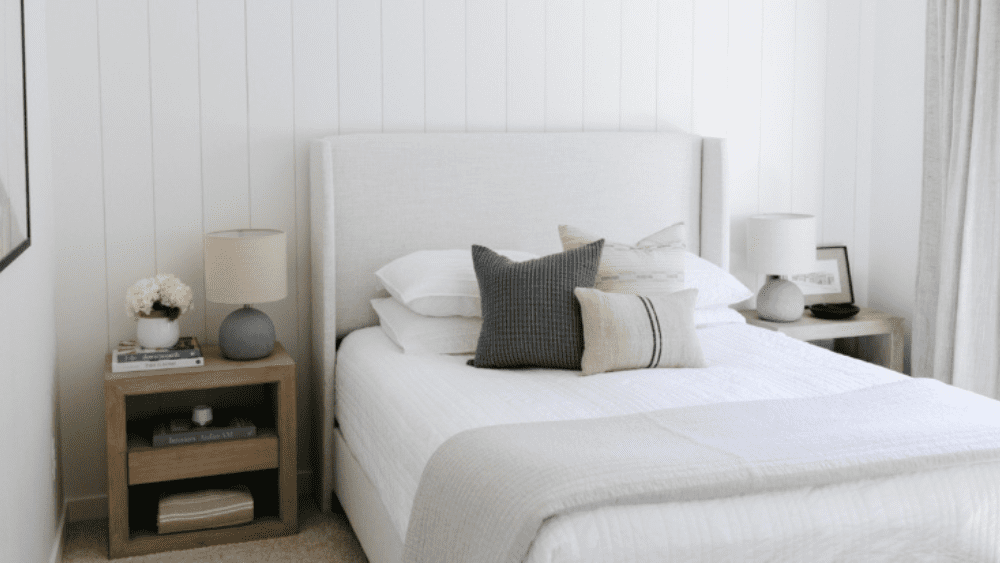White is just white, right? Not quite. In home design, white is a versatile shade that can make spaces feel open, bright and serene.
Choosing the right shade of white paint for your new home might seem simple, but with countless shades and subtle nuances, it can quickly become overwhelming.
To simplify the process, Swanbury Penglase interior designer Beatriz Chamsay, who has worked with developers such as Peet Limited, offered her advice.
White paint can enhance other features of an interior space. Picture: realestate.com.au/buy
Types of white paint
White is a popular choice in design because its variety of shades and undertones can transform spaces.
“White offers a neutral base colour to enhance other features of the interior space, whether that’s some of the other built-in features like flooring, cabinetry, or more personalised items a homeowner can bring in like artwork and furniture,” Chamsay said.
Choosing the right white can bring a room together. It serves as a versatile foundation and plays a crucial role in creating a specific atmosphere.
MORE: Design tips that will make your bathroom a dream to maintain
“There is also a subtle and sensorial experience that using the right white paint colour can bring to the space,” Chamsay said.
“When paired with good lighting, it can give that sense of openness and a bright atmosphere into people's homes.”
Here are three palettes to help you choose the right white.
Cool white
Cool whites can add a modern and minimalist look to a space. They often have blue, beige or grey undertones.
Dulux’s Lexicon Quarter is one example, ideal for open-planned spaces, interior walls, and trims.
Warm white
Warm whites usually have undertones of peach, pink or yellow. These can help bring a gentle warmth to your home, making them ideal for areas that lack natural light.
Haymes Pulp White 1 with its cream base, can complement natural finishes like wood, leather, and linen.
Neutral white
Neutral whites are more adaptable to other colours and can bring subtle effects to a space.
Taubmans Crisp White, often described as “the ultimate neutral,” is an excellent choice for complementing other colours.
MORE: Project home customisations worth spending your money on
How to choose the white right paint for your room
Selecting the perfect white paint involves more than just picking a hue that looks good in the store. According to Chamsay, several factors come into play.
"One of the main things to keep in mind when selecting a white paint is that white is never ‘just white’. When comparing different paint swatches, you’ll find there is a lot of variation between them," she said.
Some key factors to consider include:
- Temperature colour: Is the paint warm or cool?
- Undertone: Does it have a green, purple, or orange undertone?
- Vibrancy: Does the paint appear brighter or duller?
"It's often difficult to identify these in isolation, which is why comparing a variety of white colours to each other can bring out these nuances," Chamsay said.
Consider your space's lighting, as it can change the perception of colour throughout the day. Picture: realestate.com.au/buy
Here’s how you can ensure you choose the right white for your space.
1. Examine your lighting
Consider your lighting and space as it can affect how the colour looks throughout the day.
“For example, a space with a lot of natural light may opt for a cooler white as those cooler tones may be offset by the natural light, resulting in a crisp instead of overly yellow outcome,” Chamsay said.
“Alternatively, places with low levels of natural light/more artificial lighting may consider warmer whites to bring warmth into a space when factoring in the light's colour temperature.”
2. Consider the surroundings
Different types of white can complement and highlight other items within a space or stand on their own as features.
“If we think of white being a backdrop to a home, then pairing white with darker finishes can create contrast and interest in a space,” Chamsay said.
“This is where we would need to consider the materiality and scale (how much of said material there is) to achieve a sense of balance and visual harmony.”
It’s also important to consider how white would pair with other whites and lighter finishes.
Small differences in the shade and sheen of white can also create subtle but sophisticated effects.
“We could do this by isolating common elements (e.g., ceilings, ceiling mouldings, skirting boards, and architraves) to lift the space and give it a bit more visual interest in an otherwise subtle way, making it more than just a white wall,” Chamsay said.
3. Test the colour
The best way to find the right white for your home is by testing it.
Try different white paint cards or sample swatches, making sure to label them. This allows you to see how the paint looks at different times of the day and under different lighting conditions.
MORE: Should you renovate or detonate?
Chamsay also advised considering the architectural style of the home and surrounding features like the roof, decking, doors, and windows, so that the white can best complement these features.
“Lastly, ensure that the paint and primer selected is also hard-wearing to withstand wear and weather conditions so that your walls are in the best condition for a long time,” Chamsay said.
Best white paints for interior walls
When it comes to interior walls, the right shade of white can create a harmonious and inviting ambiance.
Consider cool whites with blue or grey undertones for a crisp, modern look. These are perfect for rooms with lots of natural light, giving them a sharp, clean feel.
If you prefer a warmer, more inviting atmosphere, opt for whites with subtle peach, pink, or yellow undertones. These tones work well in living rooms and bedrooms where you want to create a cosy and welcoming environment.
When choosing a white, it’s important to test various shades and observe how they change throughout the day. Picture: realestate.com.au
Best white paints for external walls
Choosing white paint for external walls requires careful consideration due to the impact of natural light.
“To pick the appropriate external white paint we would need to look at the light reflectance value (LRV) of a paint colour; the higher the number the more light is being reflected,” Chamsay said.
“Depending on how much natural light we're working with (fully exposed or shaded) it's usually recommended to pick white paints with an LRV of 85 and below, with 100 being the highest LRV.”
For exterior use, paints with subtle grey, cream, or chalky undertones can create a balanced appearance, harmonising with the natural surroundings and architectural elements like the roof, decking, and windows.
Best white paints for kitchen cabinets
Kitchen cabinets require a durable, high-quality paint that can withstand daily wear and tear while maintaining a fresh, clean look.
Opt for semi-gloss or satin finishes for kitchen cabinets, as these are easier to clean and maintain.
MORE: Why the kitchen is the most important room in the house
Crisp, cool whites can complement modern kitchens with stainless steel appliances, while warmer whites can create a homely feel in traditional or rustic kitchens.
What is the most popular white paint in Australia?
In Australia, Dulux Natural White is popular choice among homeowners and designers, as it’s renowned for its versatility.
Considered the most neutral of Dulux’s whites on offer, Natural White has a subtle warmth ideal for various styles such as Scandi, coastal or Hamptons.
What is the whitest paint?
For those seeking the purest white, look no further than vivid white paints with minimal undertones.
Dulux Vivid White, described as a “pure clean white”, provides a sharp and clean aesthetic ideal for both interior walls and exterior features such as window frames and fretwork.



















 English (US) ·
English (US) ·